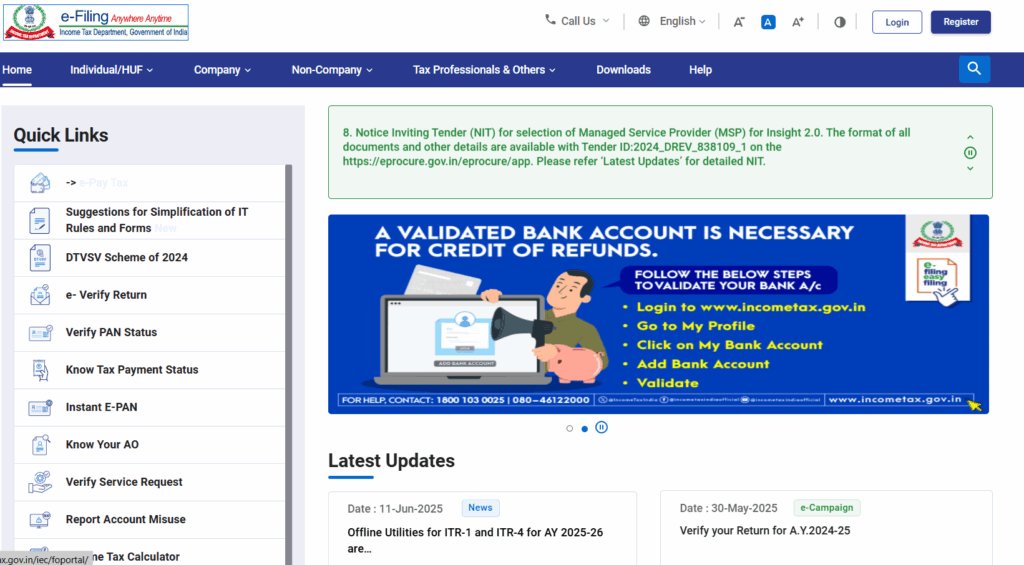As crypto adoption continues to rise in India, tax authorities are tightening the screws on compliance. Crypto investors are being advised to refile Income Tax Returns (ITRs) to ensure proper and compliant reporting of digital transactions, in line with recent government advisories and enforcement campaigns.

The Central Board of Direct Taxes (CBDT), India’s apex tax administration body, has launched a new compliance initiative nudging taxpayers to correct misreported or unreported Virtual Digital Asset (VDA) income. This includes all cryptocurrencies, NFTs, and other digital tokens. The message is clear: file right, or face scrutiny.
Crypto Investors Advised to Refile ITR
| Topic | Details |
|---|---|
| Advisory Issued By | Central Board of Direct Taxes (CBDT) |
| Action Required | Refile or revise ITRs for AY 2023–24 and 2024–25 with accurate VDA disclosures |
| Applicable Law | Section 115BBH of the Income Tax Act (introduced in Finance Act, 2022) |
| Crypto Tax Rate | Flat 30% on gains + surcharge & cess; no set-offs or deductions allowed |
| Why It Matters | Non-compliance may lead to scrutiny, penalties, or investigation for tax evasion |
| Official Resource | CBDT Official Website |
As India’s crypto landscape matures, so do its regulatory guardrails. Crypto investors must take tax compliance seriously to avoid penalties and scrutiny. The government is not against digital assets, but it does expect transparent, honest reporting.
By revisiting and correcting your ITRs today, you not only align with legal expectations but also contribute to the legitimacy of the crypto ecosystem in India. Stay informed, stay proactive, and when in doubt — always disclose.
Understanding the Context: Why Crypto Tax Compliance Matters
Since the 2022 Union Budget, India has brought crypto transactions under a strict tax regime. Any profit made from trading, selling, or exchanging virtual digital assets is taxed at a flat 30%, without the benefit of deductions (other than the cost of acquisition) or offsetting losses.
This move was aimed at formalizing the crypto ecosystem while discouraging speculative activity. But despite the clarity in law, many investors failed to report their crypto income accurately. The result? The government is now proactively reaching out to thousands of taxpayers whose ITRs don’t match the transaction records from exchanges.
Failure to comply not only invites financial penalties but can also damage an investor’s credibility when applying for loans, visas, or even jobs in financial sectors. Transparency and accuracy are no longer optional—they are expected.
The NUDGE Campaign: How the IT Department is Acting
CBDT’s “Non-intrusive Usage of Data to Guide and Enable (NUDGE)” campaign is not about harassment, but guidance. Taxpayers receive gentle email nudges asking them to:
- Review their tax filings for crypto transactions.
- Compare data available with crypto exchanges (Virtual Asset Service Providers or VASPs).
- Refile or revise their returns voluntarily before enforcement action begins.
The NUDGE campaign represents a more evolved and data-driven approach. With the rise of AI-driven analytics, the Income Tax Department can now pinpoint mismatches in disclosures, pulling from TDS reports, bank transactions, and exchange records.
Example Scenario:
Imagine you’ve bought and sold Bitcoin multiple times on an Indian exchange in FY 2022–2023, generating Rs 3 lakhs in profit. You didn’t include this in your ITR. The IT department, matching your PAN with TDS filings from the exchange, identifies this mismatch and nudges you to update your ITR.
What You Should Do: Step-by-Step Guide to Stay Compliant
Step 1: Check Your Previous ITRs

Go to the Income Tax e-Filing portal and download your filed returns for AY 2023–24 and AY 2024–25.
Step 2: Access Your Crypto Transactions
Download transaction histories from exchanges like CoinDCX, WazirX, or Binance. Check your capital gains or losses.
Step 3: Calculate Taxable Gains
Use this formula:
Taxable Income = Selling Price – Purchase Price
Apply the 30% tax rate (plus surcharge and cess) on gains. Remember, no deductions or loss set-offs are allowed.
Step 4: Check Schedule VDA in ITR
When you file or revise your return, fill in Schedule VDA, the dedicated section for crypto and digital assets.
Step 5: Use the ITR Revision Option
If you find any discrepancies, file a Revised ITR under Section 139(5) using the same portal. The last date to revise AY 2023–24 returns is 31st December 2024.
Step 6: Confirm Acknowledgment
Ensure you download and save the new ITR-V (acknowledgment) after refiling. This serves as proof of compliance in case of future queries.
Step 7: Pay Interest or Penalty If Required
If taxes were underpaid, calculate and pay the applicable interest under Section 234A/B/C to avoid further notices or penalties.
Data & Trends: Crypto and Tax in India
- More than 15 million Indians have traded in cryptocurrencies.
- The government collected over Rs 157 crore via TDS on crypto trades in FY 2022–2023.
- Thousands of email notices have been issued in the past two months alone under the compliance campaign.
- Over 50% of crypto traders were unaware of the new tax norms when they came into effect in April 2022, according to a recent Chainalysis study.
- India ranked second globally in crypto adoption in 2023, behind only Vietnam (Chainalysis Global Crypto Adoption Index).
These numbers highlight the scale and seriousness with which the government is treating VDA taxation.
Case Study: A Lesson in Timely Compliance
Rohit, a 29-year-old software developer from Bengaluru, made Rs 7 lakh in crypto profits in 2022 but failed to report it. In May 2025, he received a compliance email. He consulted a CA, revised his ITR, paid the tax with interest, and avoided penalties. This proactive step protected his creditworthiness and future financial credibility.
A contrasting case involved another trader who ignored the notice. A subsequent audit led to penalties, interest, and legal proceedings under anti-evasion provisions. The difference? Timely action.
NISM Rolls Out New Certification Exams Every AIF Manager Must Know
Telangana’s New Scheme Could Be a Game-Changer for Tribal Farmers
CBSE 2025 Syllabus Update – Shocking Changes for Class 10 & 12 Students: Must-Read New Exam Rules!
Compliance Best Practices for Crypto Investors
- Maintain records: Keep detailed logs of purchase dates, prices, sale proceeds, and wallet transfers.
- Use crypto tax tools: Platforms like KoinX, TaxNodes, and ClearTax now offer crypto tax calculators.
- Stay updated: Follow official guidelines from the Income Tax Department.
- Declare all VDAs: Even if held but not sold, declare them in appropriate schedules.
- Seek professional advice: Engage a chartered accountant or tax expert, especially for high-value portfolios.
- Monitor exchange notifications: Many exchanges provide TDS certificates and summary reports to assist with tax filing.
- Review tax regulations yearly: Crypto rules may evolve with each budget. Ensure your strategy aligns with current laws.
- Avoid P2P loopholes: Transactions outside exchanges (peer-to-peer or wallet-based) are also trackable via bank links and should be reported.
FAQs: Crypto ITR Refiling in India
Q1: Is it mandatory to refile if I missed reporting crypto income?
Yes, if your ITR has underreported or omitted VDA income, you should refile to avoid penalties.
Q2: Can I set off my crypto losses against other income?
No. Under Section 115BBH, crypto losses cannot be offset or carried forward.
Q3: What happens if I ignore the email notice from CBDT?
You may face assessment proceedings, penalties, or even investigation for tax evasion.
Q4: I only bought crypto and never sold it. Do I still need to report it?
Yes. Holding crypto should be declared in ITR under asset disclosures.
Q5: Where can I get help with filing or revising ITRs?
You can consult the Income Tax Helpline or hire a tax consultant.
Q7: Is filing crypto taxes safe for long-term investors?
Yes. Accurate and timely reporting builds credibility, aids in getting loans or foreign visas, and helps maintain regulatory compliance.







